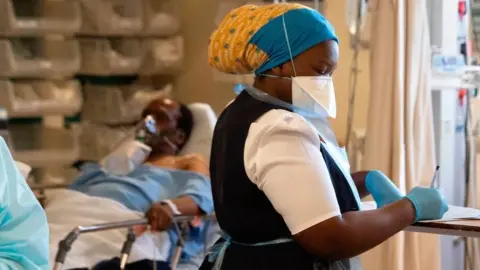Coronavirus in Africa: Concern grows over third wave of infections
 AFP
AFPCovid-19 cases and deaths are rising fast in Africa as the continent battles a third wave of infections.
The number of deaths recorded for the past week has risen by more than 40% compared with the previous week, according to the World Health Organization (WHO).
New and faster spreading variants such as the highly transmissible Delta variant are appearing in more and more countries.
Less than 2% of the continent has been fully vaccinated.
Where are cases and deaths rising?
New cases have been increasing for eight weeks running and rose by 13% over the past week compared with the previous week, according to the Africa Centres for Disease Control and Prevention (CDC).
The countries reporting the highest number of deaths over the week include Namibia, South Africa, Tunisia, Uganda and Zambia.

Hospital admissions in around 10 countries have increased rapidly and at least six countries are facing shortages of intensive care unit beds.
Demand for medical oxygen is estimated to be 50% higher than at the same time in 2020, yet supply has not kept up.
"Deaths have climbed steeply for the past five weeks. This is a clear warning sign that hospitals in the most impacted countries are reaching a breaking point," said Matshidiso Moeti, WHO regional director for Africa.
 AFP
AFPThe third wave has seen cases rising faster compared with the previous waves.
Over the past month, Africa recorded an additional one million cases, the shortest time ever it has taken to add another million cases.
During the second wave daily cases peaked at 28 cases per one million population while during the ongoing third wave the rate stands at about 33 cases per 1 million population, the Africa CDC says.
"The worst is yet to come as the fast-moving third wave continues to gain speed and new ground," says Moeti.
There are 23 countries on the continent that have so far experienced a third wave of infections, with Senegal and Malawi the latest two to be affected.
The WHO says the third wave is driven by a mix of public fatigue, social mixing, ineffective use of public health and social measures, and vaccine inequity, and the spread of new variants.
The continent's average death rate has been at 2.6% for some months now, above the global average of 2.2%.
The global fatality rate has fallen since the start of the pandemic, which in itself would put more African countries above the global average.
Rates are also affected by how much testing is done - a country with low levels of testing will show a higher death rate because many non-fatal Covid cases are not detected.
More importantly, data for deaths should be treated with caution, given the wide variations in how countries record them, and how effective their death registration systems are.
Is the Delta variant to blame?
The WHO believes the spread of the Delta variant (which is more transmissible) has contributed to an increase in both cases and deaths across the continent.
It has been reported in 17 countries so far.
It has been found in most of the samples that were sequenced in some countries experiencing a resurgence - for example DR Congo and in Uganda, where 66% of the cases of severe illness in people younger than 45 years have been attributed to it.
There is also concern that new variants can't easily be tracked because the testing required to identify them isn't widely available.
Another variant of the virus which emerged in South Africa last year, now named Beta, led to high case numbers across southern Africa.
It has been detected in 29 countries, while 32 countries have also reported the presence of a Covid-19 variant first identified in the UK, now named Alpha.
This is more widespread in countries in north, west and central Africa.
As case numbers rise again, several countries - like Tunisia, Rwanda and Uganda - have reintroduced restrictions on public gatherings and non-essential travel.
What is happening with vaccinations?
So far, Africa has lagged behind the rest of the world in Covid-19 vaccines, accounting for just 1.6% of doses administered globally.
The Seychelles has the highest rate of vaccination, having fully vaccinated 69% of its population. Morocco has a quarter of its population fully vaccinated.
Most countries in Africa are part of the international Covax vaccine-sharing scheme but so far, only 19 countries have used more than 80% of Covax-supplied doses.
And in the most populous countries on the continent, vaccination rates are still very low.
In Nigeria, only 1.9 doses of vaccines have been administered per 100 people, in Ethiopia it's 1.8 and in Kenya 2.8 doses.
It's slightly higher in Egypt at 4.5 doses, and in South Africa, it is 7.1.

